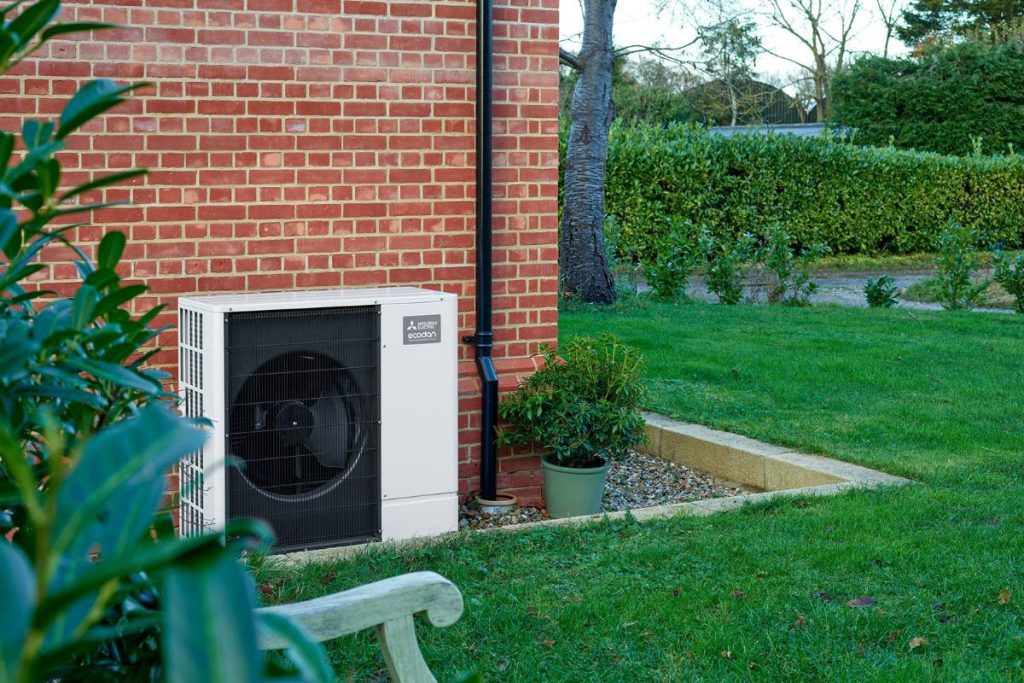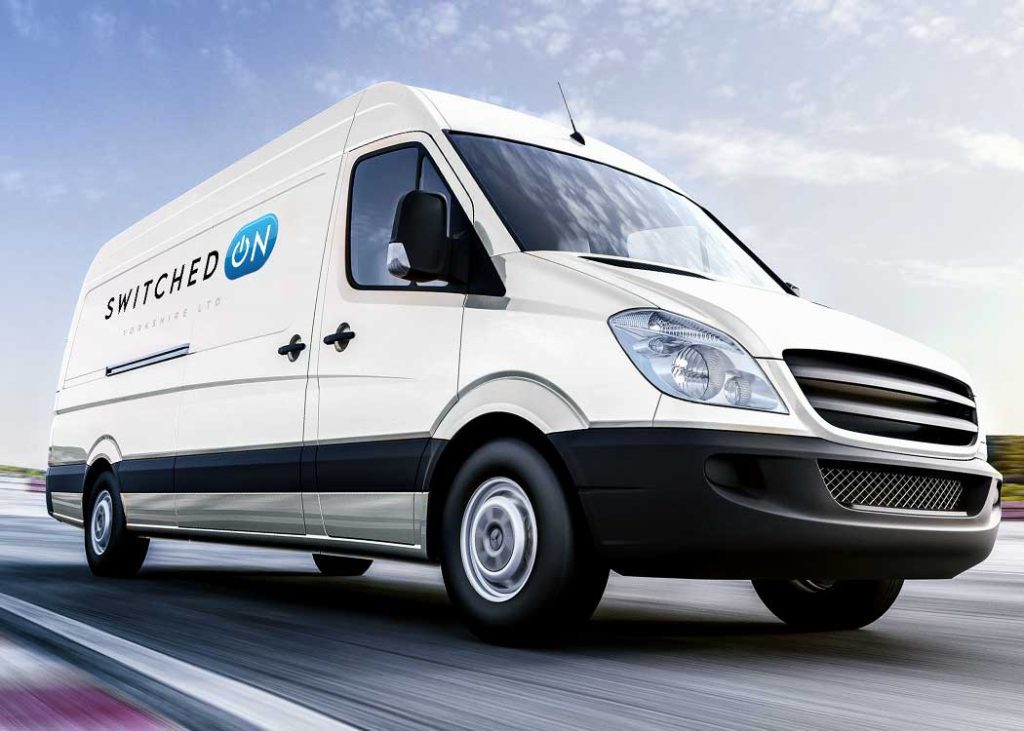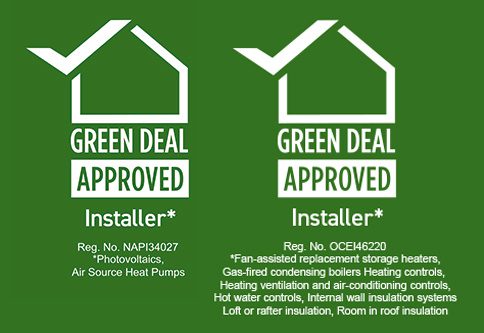Air Source Heat Pumps
Upgrade to an Air Source Heat Pump, making your home more affordable and warmer for your family. Breathe new life into your home with an energy-efficient renewable heating solution.
✔ Energy efficiency of 350%
✔ Renewable heating at home
✔ £7,500 cash back
✔ No VAT
✔ Available with ECO4 Funding
Renewable heating,
at home
Do you know how an air source heat pump works? Think about your kitchen fridge… but in reverse. While a fridge retracts warm air from the fridge and expels it into the atmosphere, an air source heat pump pulls in cooler air from the atmosphere and warms it to provide heating and hot water for your household.
By using electricity, you can benefit from renewable heating that uses much less power than traditional, fossil-fueled boilers. For every unit of electricity used by the heat pump, you will generate three or four units of heat.
Turning to renewable sources for heating is more sustainable than burning fossil fuels such as oil or coal—they do not produce carbon monoxide, nor do they contribute to greenhouse gases or harm the ozone layer.


Is an air source heat pump right for me?
Air-source heat pumps are an ideal option for residential heating, but as with most things, some households aren’t always sure if it’s the right solution for them. There are several key factors to consider before making a decision. Let us highlight these for you…
Do you have somewhere to put it?
You'll need a free-standing structure outside your home to accommodate the unit. This should have ample space around it to allow for plenty of airflow.
The install team at Switched On will be able to clue you in on how much space you’d require around your heat pump - and also which type would be better suited for your home and your requirements.
How loud is a heat pump?
Many new heat pumps are manufactured with a ‘Quiet Mark’ - meaning you won’t hear much from the unit outside your home, or the working parts throughout your hot water cylinder or your pipes. Again, we go back to the example of your household fridge - you don’t tend to hear the fan working, and it's the same process here.
The idea of a heat pump is to provide you with renewable heating, not noise disruption.
Heat Emitters
While many households have radiators installed already, many haven’t considered under-floor heating to keep their home warm - at a more ambient temperature.
If this is something you’d like to consider along with your new heat pump installation, our team of installers can talk to you about this further. Just send us a message if you have more questions to ask!
Things to consider:
Do you have a hot water cylinder?
Many modern heat pumps, such as the Mitsubishi Ecodan, provide a continuous supply of hot water via the hot water cylinder. Others may require hot water to be stored up; however you won’t tend to run low on hot water unless you’re leaving the hot water on for hours on end.
The size of the tank you need depends on how much hot water your household usually uses. Again, our experts can help you determine answers to these questions.
SAVEwith £7,500cashback
Air Source Heat Pump Service Plans
Keep your Air Source Heat Pump running efficiently with our Annual Service Plan
How much does an air source heat pump cost?
Heat pump installations can vary in price based on several factors from the size of the heat pump to how large your property is and whether your installation is for a new build or an older home. Costs typically start from around £10,000 - BUT don’t forget about the Boiler Upgrade Scheme which allows you to claim back £7,500 from your installation!
You’ll also see a dramatic drop in your energy bills - because even though your electricity use may increase slightly, you won’t be running on gas or having to pay out for oil based heating.
FAQ's
When installed correctly, an air source heat pump can produce up to four times more heating energy for the home than it consumes in electricity.
The basic principle of its efficacy is known as Coefficient of Performance or COP. For example: 3 units of environmental energy plus 1 unit of electricity equals four units of heating energy; hence a COP rating ranging from 4-5.
This is subject to suitable low-flow temps and adequate house insulation levels.
Generally, the installation process lasts about three days as you will require an outside unit and an interior one – replacing what was there before.
The English government is dedicated to reducing greenhouse gas emissions and mitigating the destructive impacts of climate change, so they’ve launched many programs aimed at convincing people and companies alike to make environmentally-friendly choices.
You can learn more about some of their initiatives by reading our advice page.
If a homeowner regularly monitors and performs preventive maintenance on their heat pump, the average lifespan can be anywhere from 15 to 20 years.
There are some jobs the owner can do themselves, such as keeping it all clean.
There are also other tasks that need to be done by a professional – such as checking whether or not any parts require repair or replacement.
Checking this every year will prevent potential issues from getting out of hand before they become too much to handle.
It isn’t necessary to run the heating all day – it’s more practical to turn it on just when you need it.
Even if your home is very well insulated, there are a few hours where you’ll want the heat, which will give the heat pump enough time to reach its optimum efficiency level.
The time needed can vary depending on how cold and poorly insulated your space is; some areas may take longer than others.
Using the heat pump as a typical boiler isn’t very productive.
It’s inefficient for devices to work at full capacity when they’re overheated.
Setting up the device for your desired temperature is much more effective and less strenuous on the machine than setting it to an extreme level; you’ll save time and also energy in no time!
The better you maintain the heating system, the less it will suffer from inefficiency and power loss.
Make sure that debris doesn’t cover any of the ducts to ensure maximum airflow and clear operation; it would also be wise to clean at least once every two weeks.
No. Many heat pumps are quiet – and the models we install at SwitchedOn often have the ‘Quiet Mark’ seal of approval.
Take advantage of the Boiler Upgrade Scheme
What are the benefits of Air Source Heat Pumps
MCS Approved
Installation
Government BUS Grant
available of £7,500
Each system is designed specifically to suit your individual home
Our technical surveyor will personally heat loss your home
For every £1 of electricity you use, it will put £3.50 back into your home
Interested in an ASHP?
Don't let just anyone install your heat pump
Switched On Yorkshire are qualified and certified as an approved Microgeneration Certification Scheme (MCS) Installer.
Our team of highly professional personnel can talk you through the process and hold your hand every step of the journey.


Ready to start your switch?
Making your home more energy efficient shouldn't be hard work. Let Switched On Yorkshire help you.
01924 820005
Renewables
Central Heating
Smart Home
Installations
Inspections & Testing
©2023 Switched On Yorkshire Ltd. Unit 1, Savile Industrial Park, Savile Road, Castleford, WF10 1PE VAT No. 265332802 Registered in England & Wales company No. 10556527












